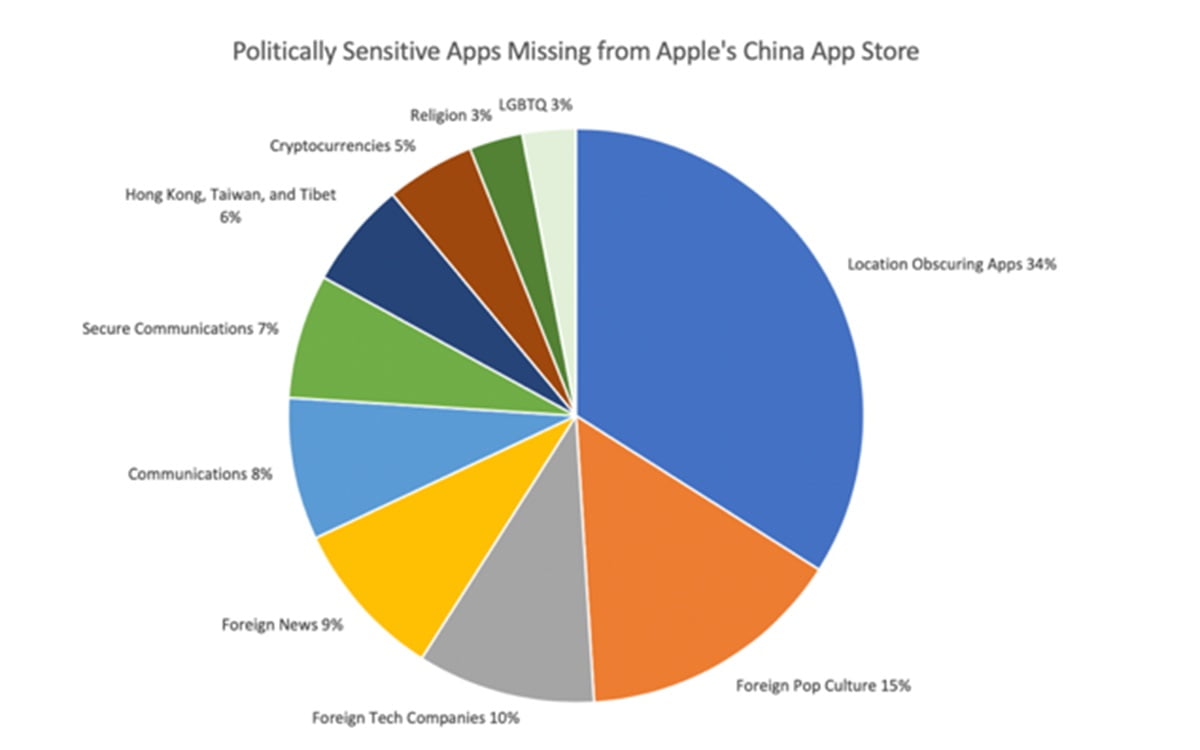TTP Investigation: Apple is Censoring Political Apps in its China App Store
Q3 2020 hedge fund letters, conferences and more
TTP Questions Apple’s Role In Censoring Political Apps In Its China App Store
WASHINGTON, D.C. – Today, Campaign for Accountability (CfA), a nonprofit watchdog group that runs the Tech Transparency Project (TTP), released a report questioning Apple’s role in the censorship of politically sensitive apps on its China App Store. Although the company claims that the majority of apps removals in the Chinese market were related to apps deemed illegal under Chinese law, including porn and gambling apps, a review by TTP found that nearly a third of all apps missing from the China App Store relate to hot button topics blocked by China’s censors, including privacy tools, Tibetan Buddhism, Falun Gong, and the Hong Kong protests.
CfA Executive Director Michelle Kuppersmith said, “The number of apps that Apple says it removes from China each year doesn’t line up with the much longer list of apps that are missing in China but commonly found in other markets. This inconsistency shows that a large number of politically sensitive apps are being pulled back from the China App Store. Apple should answer for this discrepancy.”
TTP’s analysis of censorship on Apple’s China App Store is based on data made available by Great Fire, an advocacy group that monitors censorship in China by comparing the availability of certain apps in Apple’s app stores around the world. TTP independently verified Great Fire’s raw data and determined that 964 of the 3,257 apps identified as missing from the China App Store relate to politically sensitive topics of religion, LGBTQ issues, Hong Kong, Taiwan, Tibet, secure communications, cryptocurrencies, VPNs, social media platforms, and foreign media. Just 5% of apps unavailable on the China App Store, but accessible on others, related to porn or gambling.
Justification Of Its Censorship
Apple often justifies its censorship in different markets across the world by saying it is simply complying with local laws. While some politically sensitive apps were removed at Beijing’s request, it remains unclear why other apps were removed.
Apple releases bi-annual transparency reports, which disclose data and takedown requests from various countries. But Apple does not disclose if it has removed any apps voluntarily before a government intervenes. The public disclosures appear to omit thousands of apps that are missing from the company’s China App Store, suggesting Apple may have taken them down proactively to protect its relationship with China.
From July 2018 to June 2019, Apple disclosed that it had removed 805 applications at the request of the Chinese government. It is rare for countries other than China to ask Apple for the mass removals of applications. The United States did not request for any apps to be removed during that time period. Of the 96 countries included in Apple transparency reports, 10 other governments requested app removals—none to the extent of China. The next closest country was United Arab Emirates with 275 requests and one removal.
Apple Still Has Operations In China
While other major tech companies have withdrawn their business operations from China after refusing to comply with the country’ authoritarian rules, Apple has not. The company has embraced China as its third largest market and relies on China for much of its supply chain – while claiming publicly to champion free speech and human rights. Ironically, Apple recently expressed public opposition to the United States government’s efforts to ban Chinese-owned apps WeChat and TikTok from the U.S., despite the fact that it routinely carries out this same type of app censorship on behalf of China.
Ms. Kuppersmith continued, “If Apple is choosing to soften its opposition to censorship in order to compete in the Chinese market, it should be transparent about that decision. Espousing positive corporate values only in areas where those values are accepted is simply opportunism.”
Campaign for Accountability is a nonpartisan, nonprofit watchdog organization that uses research, litigation, and aggressive communications to expose misconduct and malfeasance in public life and hold those who act at the expense of the public good accountable for their actions.






